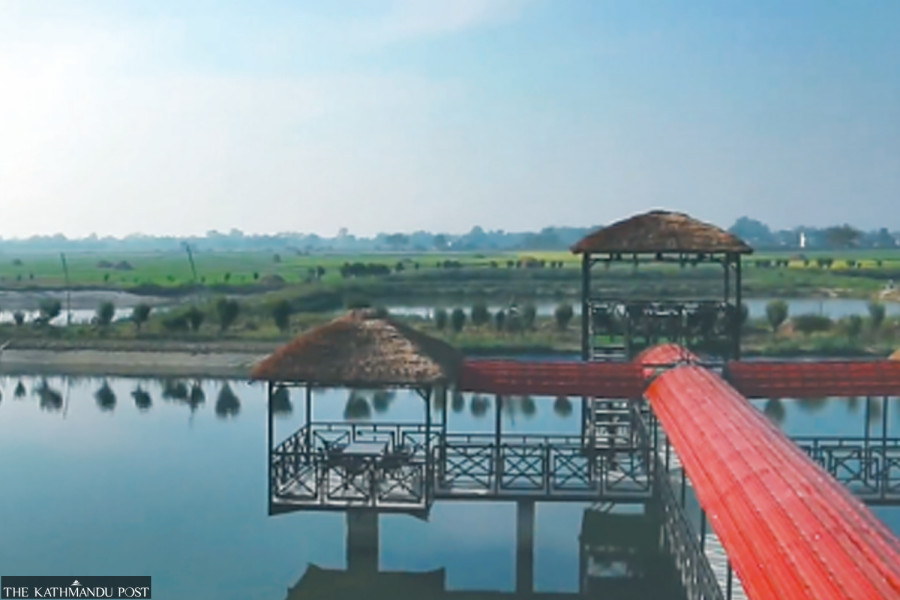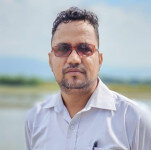National
Punya Prasad’s journey: From traditional farmer to a successful entrepreneur
He has invested Rs60 million in the Sakhiya Fish Resort, which is now a go-to spot for fish lovers and tourists.
Dipendra Baduwal
Two decades ago, when the Maoist insurgency escalated, it adversely affected Nepal’s economic activities, leaving a trail of destruction.
Private investors desisted from making investments, the government investment too slowed and foreign investors stayed away.
For Punya Prasad Chaudhary, there was something in his mind—to become an entrepreneur. But he didn't have much investment to start a venture.
He showed interest in digging a pond.
"My father Faudar Prasad helped me with Rs30,000,” said Chaudhari, 42. “I dug a pond on my 15 kattha [0.5 hectares] of land."
In the first year, Chaudhary had 1.2 tonnes of fish, and raked in Rs80,000.
Before that, his family would earn around Rs25,000 from the same piece of land where they grew paddy.
This was a big encouraging factor for Chaudhary.
Chaudhary gradually shifted away from traditional farming methods and soon became an entrepreneur. He now runs Sakhiya Fish Resort alongside the pond
Today, his resort is a go-to spot for fishing and tourism, attracting a growing number of people.
“Two decades ago, opportunities for even foreign jobs were scarce,” said Chaudhary. During that time, the tide of fish farming was rising in Rupandehi.
He followed suit.
Though the farmers didn't have prior knowledge about fish farming, they kept the opportunity when it presented itself.
In 2006, the government officials conducted training on fish farming in the village.
"That 15-minute training was helpful. It became the turning point for expanding my business,” said Chaudhary. “After the training, I invested more. I dug ponds on another 15 kattha."
He never looked back then.
Now, he has also gained recognition beyond the district. He is also considered the pioneer of fish farming in the region.
The demand for 'Rupandehi Fish' is high in the market. Apart from selling fish, many visit him seeking his advice on fish farming.
He gives business tips and shares his knowledge.
In 2006, Chaudhary’s farm was declared the highest fish producer in Rupandehi.
He now owns 12 ponds, covering an area of 7 bigha [4.74 hectares].
With the income from fish farming, Chaudhary purchased additional land. “We invested in another sector as well. With the income, I'm planning to build a house, and buy a car," he said.
"Success in fish farming is not achieved alone, it requires the support and cooperation of family members and the community."
Chaudhary also produces and sells millions of fingerlings. He also exports fish to India.
His venture into tourism, however, is new. They have invested Rs60 million in the fish resort spread over 25 kattha [0.8 hectares] in the last two years.
The resort, which incorporates local art and culture, has become a centre of attraction. They also prepare various fresh fish delicacies, which they offer to the guests at the resort.
They have also established fish restaurants overlooking the pond. Thirty people can dine there at once. The restaurants employ 16 individuals.
"The resort is also running smoothly. Tourists can enjoy a variety of fish dishes, which adds to their satisfaction,” he said. The resort boasts of 12 well-furnished rooms.
There are conference halls equipped to host various events. "We are planning to accommodate up to 80 guests at a time," said Chaudhary. The concept of integrating farms with tourism mitigates risks, he said. “This is why I have expanded fish farming and tourism businesses simultaneously," he said.
Chaudhary sells 70 million fingerlings annually, which fetches him Rs6 million.
Chaudhary was also honoured with dozens of local and national awards.
As more and more farmers are being attracted towards fisheries in Rupandehi, the government has also launched programmes to address the challenges posed by commercial fish farmers.
However, farmers say that there are many challenges nowadays like high interest rates, rising prices of feed, lack of market access, and high electricity charges.
"There are many things to be resolved. The first step is to tighten fish imports,” he said.
The farmers involved in commercial fish farming have been supported by the Prime Minister's Agriculture Modernization Project.
"It's not that the government isn't providing support, but there are many problems affecting the growth of farmers,” said Chaudhary.




 22.65°C Kathmandu
22.65°C Kathmandu












